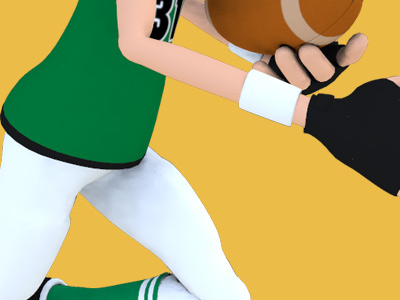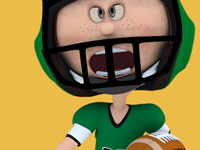American football

American football Interception
In ball-playing competitive team sports, an interception or pick is a move by a player involving a pass of the ball—whether by foot or hand, depending on the rules of the sport—in which the ball is intended for a player of the same team but caught by a player of the opposing team, who thereby usually gains possession of the ball for their team. It is commonly seen in football, including Canadian and American football, as well as association football, rugby league, rugby union, Australian rules football and Gaelic football.
In American or Canadian football, an interception occurs when a forward pass is caught by a player of the opposing team. This leads to an immediate change of possession during the play: the defender who caught the ball immediately attempts to move the ball as far towards the opposing end zone as possible. Following the stoppage of play, if the interceptor retained possession of the ball, his team takes over possession at the spot where he was downed.
Interceptions are predominantly made by the secondary or (on some occasions) the linebackers, who are usually closest to the quarterback's intended targets, the wide receivers, running backs, and tight ends. Less frequently, a defensive lineman may get an interception from a tipped ball, a near sack, a shovel pass, or a screen pass, but are more likely to force a fumble than get an interception. As soon as a pass is intercepted, everyone on the defense immediately acts as blockers, helping the person with the interception get as much yardage as possible and perhaps a touchdown (commonly called a "pick six"); at the same time, everyone on the offense becomes the defense and may attempt to tackle the ball-carrier.
If the intercepting team can run out the clock, the intercepting player may down the ball immediately and not attempt to gain any yardage. This eliminates the chance of a fumble that could be recovered by the other team. There are also player safety implications: when the ball is turned over, the play is now suddenly and unexpectedly moving in the opposite direction. All of the players on offense are instantly susceptible to unexpected blocks, even if not attempting to stop the ball carrier; a hard and unseen block can result in severe injuries. Additionally, offensive players, particularly the quarterback, are often inexperienced tacklers and are at risk of injuring themselves while tackling the ball carrier.
Only the interception of a forward pass is recorded statistically as an interception, for both the passer and the intercepting player. If a receiver fails to catch the ball and bobbles or tips it before it is intercepted, even if his action was entirely responsible for the interception, it is always recorded as an interception thrown by the passer. The interception of a lateral pass is recorded as a fumble by the passer.
SPORTS



American Football
Game play in American football consists of a series of downs, individual plays of short duration, outside of which the ball is dead or not in play. These can be plays from scrimmage – passes, runs, punts, or field goal attempts (from either a place kick or a drop kick) – or free kicks such as kickoffs and fair catch kicks. Substitutions can be made between downs, which allows for a great deal of specialization as coaches choose the players best suited for each particular situation. During a play, each team should have no more than 11 players on the field, and each of them has specific tasks assigned for that specific play.
Rules and gameplay
- Scoring
- Maneuvers
- Strategy
- Play types
- Penalties
- Turnovers
- Downs
- Teams and positions
- Field
- Equipment
- Duration and time stoppages
- Advancing the ball and downs
- Kicking
- Officials and fouls
Positions
Offensive (Interior) line
Backs and receivers
Defensive line
Linebackers
Defensive backs
Special teams
- Kicker (K)
- Holder (H)
- Long snapper (LS)
- Punter (P)
- Kickoff specialist (KOS)
- Kick returner (KR) and Punt returner (PR)
- Upback
- Gunner
- Jammer


RESOURCES
This article uses material from the Wikipedia articles "American football", "American football rules", "Interception", which is released under the Creative Commons Attribution-Share-Alike License 3.0.
© Stories Preschool. All Rights Reserved.





